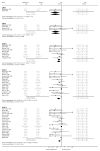The interpretation of systematic reviews with meta-analyses: an objective or subjective process?
- PMID: 18495019
- PMCID: PMC2408567
- DOI: 10.1186/1472-6947-8-19
The interpretation of systematic reviews with meta-analyses: an objective or subjective process?
Abstract
Background: Discrepancies between the conclusions of different meta-analyses (quantitative syntheses of systematic reviews) are often ascribed to methodological differences. The objective of this study was to determine the discordance in interpretations when meta-analysts are presented with identical data.
Methods: We searched the literature for all randomized clinical trials (RCT) and review articles on the efficacy of intravenous magnesium in the early post-myocardial infarction period. We organized the articles chronologically and grouped them in packages. The first package included the first RCT, and a summary of the review articles published prior to first RCT. The second package contained the second and third RCT, a meta-analysis based on the data, and a summary of all review articles published prior to the third RCT. Similar packages were created for the 5th RCT, 10th RCT, 20th RCT and 23rd RCT (all articles). We presented the packages one at a time to eight different reviewers and asked them to answer three clinical questions after each package based solely on the information provided. The clinical questions included whether 1) they believed magnesium is now proven beneficial, 2) they believed magnesium will eventually be proven to be beneficial, and 3) they would recommend its use at this time.
Results: There was considerable disagreement among the reviewers for each package, and for each question. The discrepancies increased when the heterogeneity of the data increased. In addition, some reviewers became more sceptical of the effectiveness of magnesium over time, and some reviewers became less sceptical.
Conclusion: The interpretation of the results of systematic reviews with meta-analyses includes a subjective component that can lead to discordant conclusions that are independent of the methodology used to obtain or analyse the data.
Figures

References
-
- Egger M, Smith GD, O'Rourke K, Egger M, Smith GD, Altman DG. Systematic reviews in health care Meta-analysis in context. Vol. 2. London: BMJ Publishing Group; 2001. Rationale, potentials, and promise of systematic reviews; pp. 3–19.
-
- Moher D, Cook DJ, Eastwood S, Olkin I, Rennie D, Stroup DF. Improving the quality of reports of meta-analyses of randomised controlled trials: the QUOROM statement. QUOROM Group. Lancet. 1999;354:1896–1900. - PubMed
-
- Pai M, McCulloch M, Gorman JD, Pai N, Enanoria W, Kennedy G, Tharyan P, Colford JM., Jr Systematic reviews and meta-analyses: an illustrated, step-by-step guide. Natl Med J India. 2004;17:86–95. - PubMed
MeSH terms
Substances
LinkOut - more resources
Full Text Sources

